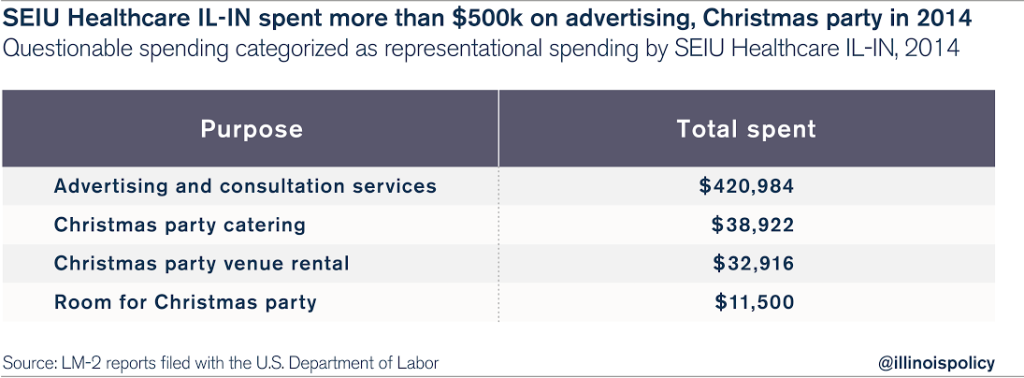Dues and don’ts: SEIU spent caregivers’ money for ‘representation’ on advertising, Christmas party
SEIU spent hundreds of thousands of dollars on things clearly unrelated to the representation of union members.
For years, home day care providers caring for low-income children in Illinois were forced to pay money to a union in order to receive state support. But now they’re fighting for a refund, and it’s clear why.
The union on the receiving end of that money – the Service Employees International Union Healthcare Illinois & Indiana, or SEIU – spent hundreds of thousands of dollars on things most observers would say are clearly unrelated to the representation of union members. However, notwithstanding the definition of “representational activities” in federal spending reports, the SEIU lumped questionable spending in with other items in this category.
In Illinois, workers who want no part in union membership are forced to pay “fair share” fees to cover the cost of representation by the union in the workplace. (However, since July 2014, the SEIU can no longer force home day care providers to pay these fees.) But all too often, fee payers can be left in the dark as to where their money is actually going.
While the federal filing doesn’t prove the SEIU spent fee-payer money on these items, it suggests the union might have.
It is extremely difficult for day care providers to find out whether the six-figure “advertising” expense, for example, was relevant to collective bargaining. These caregivers cannot be confident their fees were spent only on representation, because whether this money was used in the collective-bargaining process or for lobbying voters on a particular issue is left unknown.
Why? Because the SEIU decides for itself what spending should be charged to fee payers. As noted by the Supreme Court in its ruling in Knox v. Service Employees International Union, Local 1000, a union’s auditors “typically do not make a determination as to whether particular expenditures are chargeable,” but rather “take the union’s characterization for granted and perform the simple accounting function of ensuring that the expenditures which the union claims it made for certain expenses were actually made for those expenses.”
But why were these day care providers, who weren’t employees of anyone, forced to pay fees in the first place? Here’s how it happened:
In 2005, former Gov. Rod Blagojevich declared via executive order that because thousands of Illinois day care providers received state subsidies in exchange for serving low-income communities, they should be considered state employees, and thus forced to pay money to the SEIU.
More than 50,000 day care providers were unionized and forced to pay union dues or fees to the SEIU to keep receiving payments from the state, despite the fact that less than 28 percent of them voted to be part of the union. The SEIU then collected approximately $10 million annually in union dues and fees.
The Illinois Policy institute and the Liberty Justice Center sought to have the Harris v. Quinn ruling applied to home day care providers, and in July 2014, former Gov. Pat Quinn notified downstate day care provider Laura Baston that the state would do just that. On July 1, 2014, Illinois stopped withholding union fees from benefit checks going to day care providers who did not belong to the union.
In the first six months of 2015 alone, the Harris v. Quinn ruling and its application by Quinn saved $4 million for Illinois’ home care and day care providers. That money used to flow to union coffers.
Now, a class-action lawsuit filed on behalf of nonunion day care providers seeks to make the SEIU repay the tens of millions of dollars it wrongfully took from those workers from 2005 to 2014.
No Illinois worker should be forced to send money to a private organization. And resources are available for home care and day care providers who want information about opting out of union membership. Child care providers can find help at Care for Illinois. And personal care providers can visit Leave the SEIU for more information.

